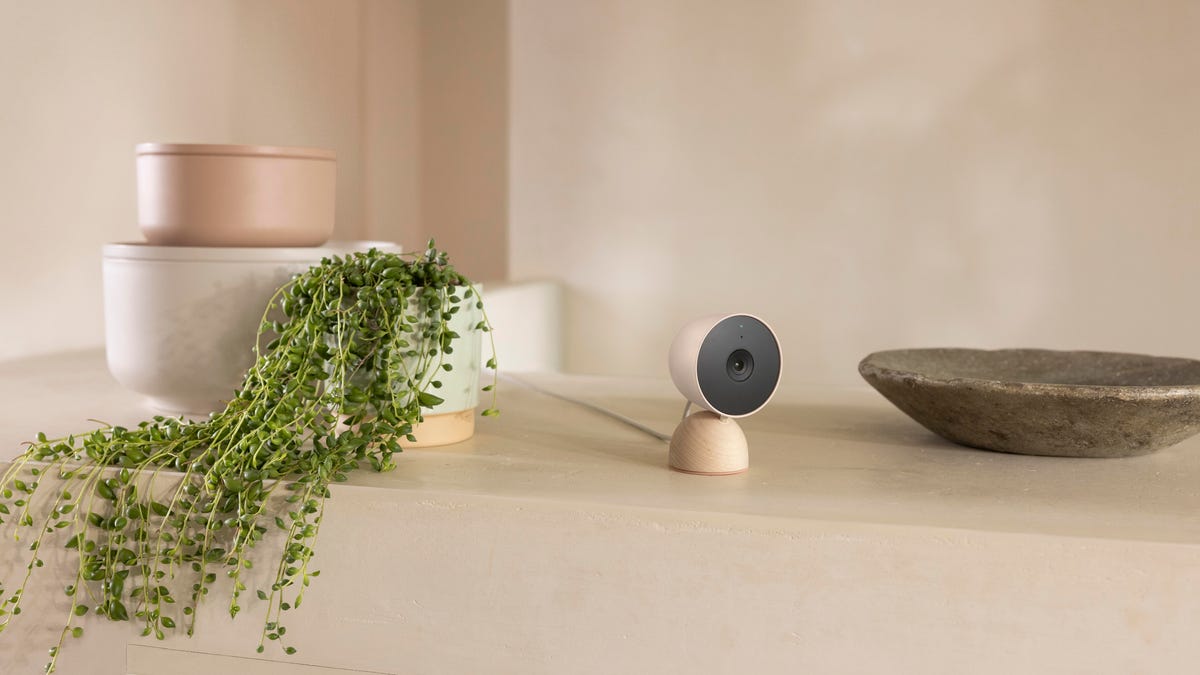Google cannonballs back into the home security market: Four big takeaways
Commentary: It's been a long time coming.

Google has dipped its toes into the home security pool for years now, largely through its smart home brand Nest -- a brand that, before it was acquired by Google, got its start with smart thermostats before branching into security cameras. In 2021, though, the tech giant is cannonballing into home security and splashing some competitors along the way.
Google Nest is launching a new line of home security devices, including a video doorbell and three new cameras. Along with the devices, the company will be refining the Google Home app, to give easier access to video feeds from its various smart cams. These changes are newsworthy on their own, but they also lend insight into the direction of the company and the home security industry writ large.
I spoke to Sophie Le Guen, director of product management for Home and Nest, at the end of July. Here are the four biggest takeaways from that conversation and Google's latest product announcement.
Google is changing its approach to home security
Up until now, Google's approach to home security has been fairly piecemeal: you had a Nest Cam here, a Nest Hello video doorbell there. Then you had Nest Secure, a DIY security system that Google started in 2017 and killed a mere three years later.
All these security devices came out of the Nest brand, which Google bought for $3.2 billion in 2014, largely off the promise of Nest's smart thermostat and the software powering it. Yes, Nest is a smart home brand, but it isn't primarily a home security brand -- which perhaps explains why it hasn't released a new security camera since 2017.
This new line of products feels a little different. You've got a competitively priced and feature-rich video doorbell to answer Ring's latest release; you've got an indoor camera for under a hundred bucks; you've got Google's first floodlight cam; and you've got a solid indoor/outdoor cam to rival midrange devices from well-reviewed competitors like Arlo. What's more, all four of these devices are unified under a single aesthetic and branding push -- the previous Nest Cams are being replaced with this new line.
For the first time, it feels a little like Google Nest has a unified approach to home security, and that's exciting.
The home security market is getting more competitive
As much as I hate to use the word "disrupt," Wyze really did just that to the home security market when it launched its $20 security cameras back in 2018. Since then, it's been a race to the lowest prices for many device-makers, including Amazon's Blink and Arlo.
Google is bringing down its prices with the new $99 indoor cam, but it's also finding a new place to cut costs: Customers won't have to pay monthly fees to get access to on-device and cloud storage for footage, smart notifications or motion zones. (On-device data storage isn't new for Google; the latest Nest smart speakers and displays have it, too.)
When I asked Le Guen whether Google plans to keep these benefits free in the long term -- not charging for them later on -- she assured me the company is committed to doing so.
In addition, the wireless Nest video doorbell, which will include those same features for free, will clock in at $179 -- $20 cheaper than the most recent wireless video doorbells from competitors like Ring and Arlo.
Google could edge out competitors' video doorbells and security cameras with this new line of devices, and that added competition is good for consumers.
Security and privacy continue to be central to Google's vision
Google doesn't give nearly as much lip service to security and privacy as, say, Apple, but it does continue to prioritize local processing.
Video footage will be encrypted while in transit from these video devices and while at rest on Nest servers, and all the processing (like distinguishing between packages, people, vehicles and animals, or processing face biometrics) will happen on the devices themselves -- meaning that footage doesn't need to be sent to the cloud other than for storage purposes. Encrypting at these vulnerable in-transit and at-rest points in the chain helps prevent unauthorized access to your data from would-be hackers and spying eyes.
While Ring offers more thorough end-to-end video encryption, it's only on wired devices, and it's something users have to opt into.
Connected home security is exploding
Home security is booming right now, thanks to companies as varied as Wyze, Amazon, SimpliSafe, Comcast and Google. Smart cams have matured and are becoming more affordable, video doorbells are getting smarter and more usable, and home security systems are offering mixes of DIY flexibility and professional support. The result is a competitive market in which customers have unprecedented choice, between ambitious startups and established tech giants, piecemeal sensibilities and holistic solutions.
That incredible level of choice is part of what's driving the massive expansion of the home security market. Giving people the option to customize their smart home systems rather than buying into entire packages makes them more comfortable dipping a toe into these tech-rich waters. Le Guen cited the increasing sales of video doorbells and home security cameras as part of the reason Google is recommitting to the market -- and Google's suite of products (it's released only one more smart speaker in the past five years than it's announced security cameras this month!) only reinforces the point.
What now?
We won't know exactly whether this new round of Google Nest products are worth picking up until we get our hands on them. If they do what Google says they do, you can look forward to several new, feature-filled and affordable options for keeping an eye on your home in 2021.



